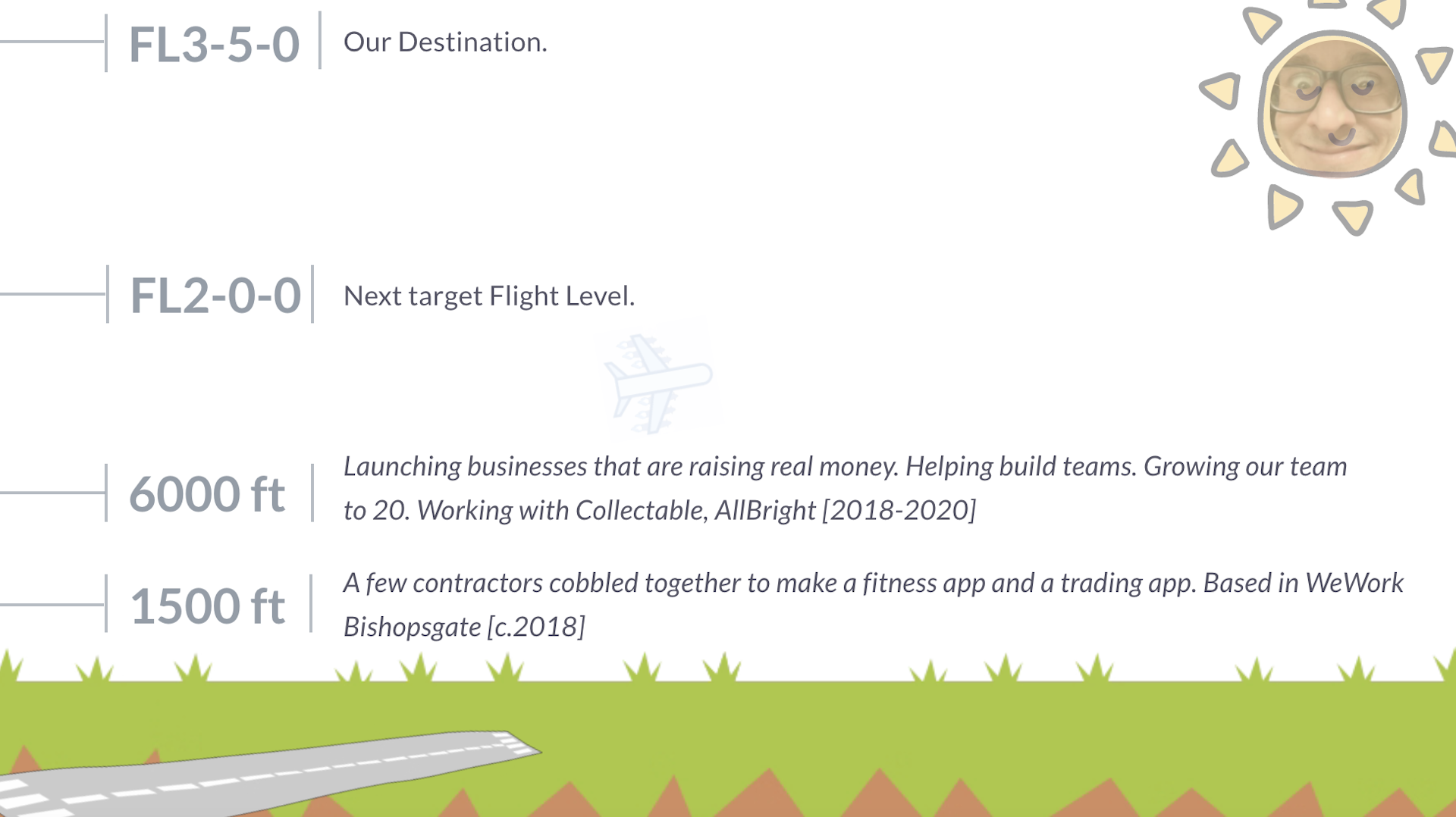Revenue is a vanity metric: How to build an authentic business plan
By CJ Daniel-Nield - 5 September 2025
4 Min Read
A few years after starting Planes, with more people and more projects, it felt like we needed to start acting like a ‘grown up’ business. It was going to take a bit more than hope to make sure everyone in the team was able to align as we began to grow.
We realised we needed a proper plan. To get there we had to ask a bunch of tricky questions: Where are we headed? How are we getting there? What are our goals? How do we measure success? What’s important to us?
To build our first yearly plan for Planes we turned where all new founders go — to Google. We followed best practices and set out a five, three and one-year vision with goals for the coming 12 months, then took it to our team.
It fell apart at the first hurdle.
The team came back with questions like: "Sure, we meet this revenue target. But what happens if we lose our culture along the way?” and “Where did this number even come from in the first place?”. Our plan didn’t feel right because it didn’t align with us as a business. It didn’t hold up because it wasn’t authentic.
When you're putting together a business plan, why does it matter if you make £3m this year? It doesn’t. What matters is how that revenue affects different parts of the business. How it affects the kind of work you do and the impact that work has outside your four walls. How revenue affects your team and, most importantly, the fun you have along the way.
Startups need a business model and plan that puts those priorities front and centre, and factors in the balance that exists between them all. That’s where the Planes Flight Plan comes in.
What’s really driving your growth?
Once we’d decided to rebuild our own business plan, we pulled together some resources that did resonate with us. Design agency Accept and Proceed’s Living Business Plan takes nine priorities that they measure quarterly. This seemed like a good way of keeping an eye on all aspects of the business.
As founders, I recommend thinking about what's important to you day-in-day-out and what drives business growth. We came up with seven things that explain why we’re all here in the first place: seven engines of growth. For Planes, these are:
🧑✈️Crew: Ours is a people business, more than most. We need to always consider what's good for our team.
🎨 Craft: We need to be product experts and to continuously evolve. Being ahead of the game allows us to be more creative in our problem-solving and offer more than our competitors.
💲Finance: Revenue is vanity, profit is sanity, and cash is king. Running a healthy, profitable business ensures our independence and gives us the ability to grow, diversify and change.
👯 Reputation: It doesn't matter how good our work is if no one knows who we are. Building a reputation for the studio allows us to keep growing the impact of the work we do and the clients we work with.
🤝 Impact: We have the ability to influence change beyond the things we build; by working in ways that prove to us and to our clients that good business is defined by more than just money.
📊 Projects: We want to work with bigger clients to solve hard, meaningful problems for the masses. When our parents ask us if we've made anything they've used, we want to be able to say yup!
💃🏿 Fun: We do our job every day partly because we enjoy it. Growing will be hard, larger clients will be more demanding, and doing things that matter will be tiring. But at the end of the day, we need to keep having fun otherwise it’s not worth it.
Every quarter we measure ourselves against our engines by getting the whole team to score us out of 10. We organise an away day to look at how we’re tracking as a business, right down to the financials and team progression — and to do something fun away from our desks.

Growth happens in stages, not timelines
Good planning helps you get where you need to go, no question. But I would argue that putting together a forecast feels a bit naff in a small business like ours. Where things change so fast and arbitrary deadlines are exactly that — arbitrary.
At Planes, we’re more interested in the trajectory than whether we get somewhere this quarter or next. Instead of setting ourselves a timebound goal, say making £3m this year, we prefer to think in terms of stages; that is becoming a £3m-a-year business. Flight Levels are what we call these stages.
Flight Levels allow us to look at how we’re scoring against our seven engines based on where we are as a business, so we can make informed decisions on where to direct our attention and what to prioritise.
Right now we are working towards Flight Level 2-0-0, which involves us learning how to operate as a 40-person business, dedicating more time to improving pathways into tech, and working with a wider range of clients. Good at this stage is very different to what it was when we were a handful of desks in a WeWork. Our Flight Levels are what provide this context.
By listening to our team and keeping an eye on the bigger picture, we’ve ended up with a business plan that feels flexible, authentic and true to Planes. And it’s grownup enough to get us where we want to be.